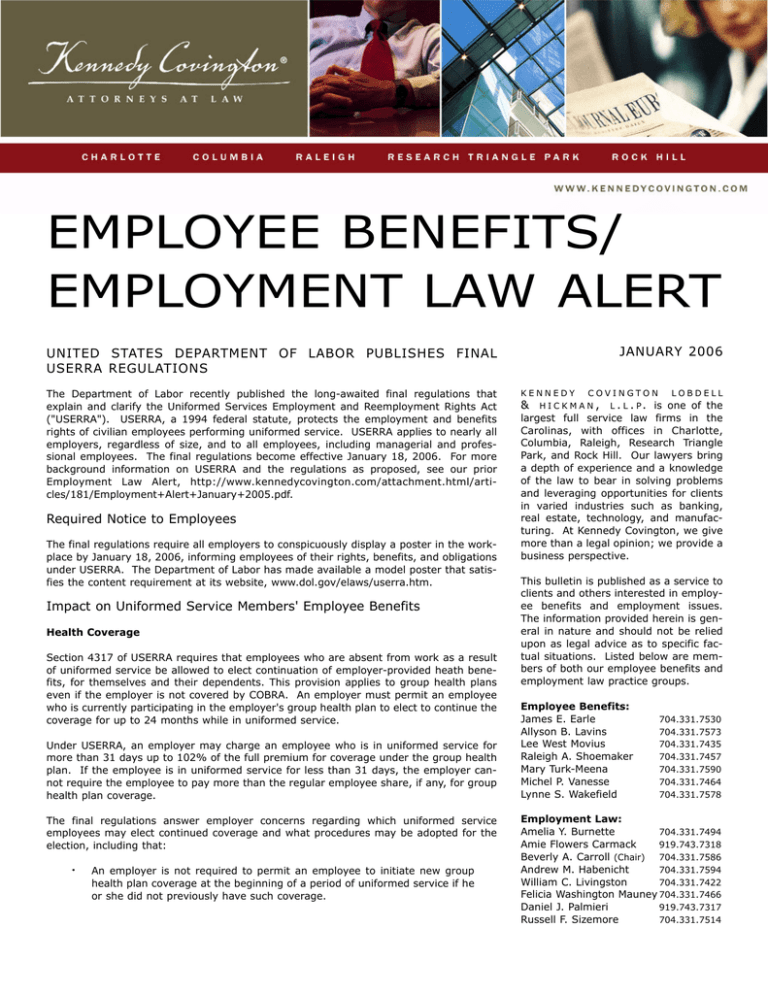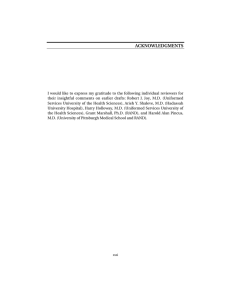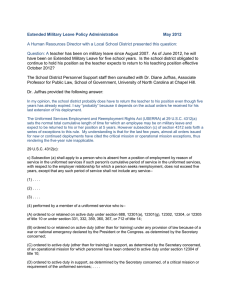EMPLOYEE BENEFITS/ EMPLOYMENT LAW ALERT JANUARY 2006
advertisement

EMPLOYEE BENEFITS/ EMPLOYMENT LAW ALERT JANUARY 2006 UNITED STATES DEPARTMENT OF LABOR PUBLISHES FINAL USERRA REGULATIONS The Department of Labor recently published the long-awaited final regulations that explain and clarify the Uniformed Services Employment and Reemployment Rights Act ("USERRA"). USERRA, a 1994 federal statute, protects the employment and benefits rights of civilian employees performing uniformed service. USERRA applies to nearly all employers, regardless of size, and to all employees, including managerial and professional employees. The final regulations become effective January 18, 2006. For more background information on USERRA and the regulations as proposed, see our prior Employment Law Alert, http://www.kennedycovington.com/attachment.html/articles/181/Employment+Alert+January+2005.pdf. Required Notice to Employees The final regulations require all employers to conspicuously display a poster in the workplace by January 18, 2006, informing employees of their rights, benefits, and obligations under USERRA. The Department of Labor has made available a model poster that satisfies the content requirement at its website, www.dol.gov/elaws/userra.htm. Impact on Uniformed Service Members' Employee Benefits Health Coverage Section 4317 of USERRA requires that employees who are absent from work as a result of uniformed service be allowed to elect continuation of employer-provided heath benefits, for themselves and their dependents. This provision applies to group health plans even if the employer is not covered by COBRA. An employer must permit an employee who is currently participating in the employer's group health plan to elect to continue the coverage for up to 24 months while in uniformed service. Under USERRA, an employer may charge an employee who is in uniformed service for more than 31 days up to 102% of the full premium for coverage under the group health plan. If the employee is in uniformed service for less than 31 days, the employer cannot require the employee to pay more than the regular employee share, if any, for group health plan coverage. The final regulations answer employer concerns regarding which uniformed service employees may elect continued coverage and what procedures may be adopted for the election, including that: · An employer is not required to permit an employee to initiate new group health plan coverage at the beginning of a period of uniformed service if he or she did not previously have such coverage. KENNEDY COVINGTON LOBDELL H I C K M A N , L . L . P . is one of the & largest full service law firms in the Carolinas, with offices in Charlotte, Columbia, Raleigh, Research Triangle Park, and Rock Hill. Our lawyers bring a depth of experience and a knowledge of the law to bear in solving problems and leveraging opportunities for clients in varied industries such as banking, real estate, technology, and manufacturing. At Kennedy Covington, we give more than a legal opinion; we provide a business perspective. This bulletin is published as a service to clients and others interested in employee benefits and employment issues. The information provided herein is general in nature and should not be relied upon as legal advice as to specific factual situations. Listed below are members of both our employee benefits and employment law practice groups. Employee Benefits: James E. Earle Allyson B. Lavins Lee West Movius Raleigh A. Shoemaker Mary Turk-Meena Michel P. Vanesse Lynne S. Wakefield 704.331.7530 704.331.7573 704.331.7435 704.331.7457 704.331.7590 704.331.7464 704.331.7578 Employment Law: Amelia Y. Burnette 704.331.7494 Amie Flowers Carmack 919.743.7318 Beverly A. Carroll (Chair) 704.331.7586 Andrew M. Habenicht 704.331.7594 William C. Livingston 704.331.7422 Felicia Washington Mauney 704.331.7466 Daniel J. Palmieri 919.743.7317 Russell F. Sizemore 704.331.7514 · A group health plan administrator may develop reasonable requirements addressing how continued coverage may be elected, consistent with the terms of the group health plan and with USERRA's exceptions to the notice of uniformed service requirement. Protections from Discrimination On the Basis of Uniformed Service The final regulations contain explanations and clarifications of USERRA dealing with anti-discrimination and job protection, including that: Pension Plans · The final regulations also address reemployed uniformed service employees' rights in employer-sponsored pension plans covered by ERISA and certain pension plans not covered by ERISA, including state, government entity, or church sponsored plans. USERRA requires an employer to treat a reemployed uniformed service employee as though there had been no break in service for purposes of participation, vesting, and accrual of benefits in the employer's pension plan. The definition of "service in the uniformed services" includes a broader group of military services than prior definitions, such as "funeral honors duties" and "disaster relief duties." · USERRA applies to National Guard members acting under federal authority, but does not apply to National Guard members acting under a state's authority. · An employer has an affirmative defense to USERRA discrimination claims and bears the burden of proving that any adverse employment action against a uniformed service employee would have occurred despite the uniformed service, such as the result of an intervening reduction-in-force that would have eliminated the employee's position. · USERRA's provisions prohibiting discrimination and retaliation in initial employment apply to all covered employers and positions, including brief and non-recurrent positions; however, USERRA's reemployment rights and benefits provisions do not apply to brief and non-recurrent positions where the employee would have no reasonable expectation of continued employment for an indefinite period. · An employer may not force a service member to use accrued vacation time during a uniformed service absence although the employee may opt to use accrued vacation time or similar accrued leave, but not accrued sick leave, to continue his or her civilian compensation. · An employer must reemploy a returning service member employee even though the employer has hired a replacement employee and reemploying the service member requires the employer to terminate the replacement employee. USERRA covers virtually all types of pension plans, including defined benefit retirement plans, 401(k) and other defined contribution plans, and executive compensation plans. In the case of a defined benefit plan, the employee's accrued benefit must be increased for the period of uniformed service once the employee is reemployed. In the case of a 401(k) or other savings plan, the employee must be allowed to make up his or her missed contributions or elective deferrals. If the employee contributes, the employer is required to make any related matching contributions according to the plan's matching contribution formula. USERRA and the final regulations provide additional guidance for determining the timing and amount of contributions, including that: · · Employees participating in 401(k) or other savings plans have three times the length of their uniformed service to contribute make-up contributions, up to a maximum of five years. Employer contributions attributable to a period of uniformed service but not based on employee make-up contributions, must be made within ninety days of reemployment, unless plan contributions for that period are normally due later. · When the employee's rate of compensation is used to determine benefit entitlement, the calculation must be made using the rate of compensation the employee would have received but for the period of uniformed service. · Employees who received a distribution of all or part of their accrued benefit from a defined benefit plan in connection with his or her uniformed service must be allowed to repay the withdrawn amounts, plus interest, upon reemployment. Kennedy Covington Lobdell & Hickman, L.L.P. Hearst Tower, 47th Floor 214 North Tryon Street Charlotte, NC 28202 www.kennedycovington.com Notice: This communication (including any attachment) is being sent on behalf of Kennedy Covington Lobdell & Hickman, L.L.P. and may be considered a "commercial mail message" for purposes of the CAN-SPAM Act. © Copyright 2006 Kennedy Covington Lobdell & Hickman, L.L.P.

